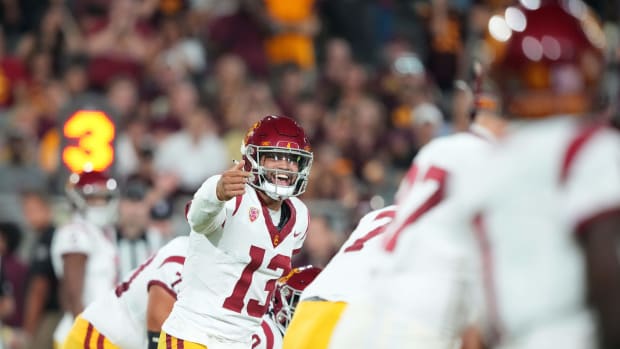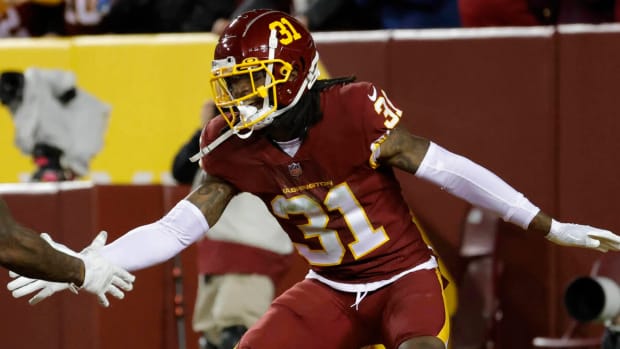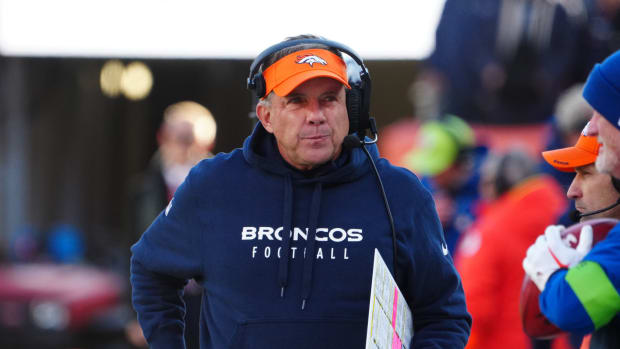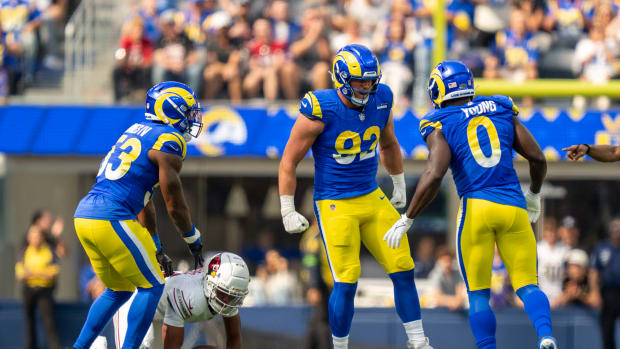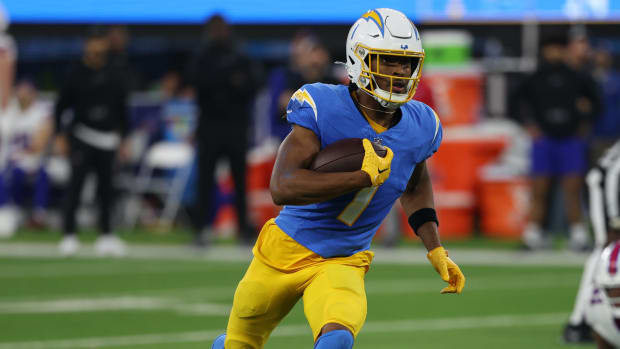Eagles’ Howie Roseman Went From ‘Cap Guy’ to Executive of the Year
I have said this since September: It’s the Eagles’ year; the rest of the league is just living in it. They have rolled through their schedule (16–1 in games with their starting quarterback), had two noncompetitive playoff games against the overmatched Giants and quarterback-less 49ers (Philadelphia knocked both of their quarterbacks out of the game) and now are on the verge of a Super Bowl title. I think they will win Sunday, and I’ll go out on a limb and give a hot take: I don’t think it will be close. I think their talent will overwhelm the Chiefs, as it has so many teams this year. Speaking of that talent, I thought I would give an up-close look at the architect of the team, Eagles general manager Howie Roseman.
“Cap guy” turned general manager
I have known Roseman for more than 20 years. We met through his mentor, former Eagles president Joe Banner, who once showed me the dozens of letters he had received from Roseman over the years in his dogged pursuit of a job there, a position gained through sheer perseverance.
Roseman and I were colleagues as contract negotiators and cap managers, sharing the same strategies on cap management in extending core players early in their careers and a “pay as you go” strategy rather than pushing out cap problems into the future. We later worked together at the Eagles after I had left the Packers and moved to Philadelphia; the team was moving Roseman from the cap/contracts area to the personnel/scouting side of the building, to be groomed eventually for the general manager role. During this transition period, I served as a consultant with the team to negotiate their contracts and train the young employees they had in that area. In my time there, I saw that, while Roseman was and is an excellent negotiator, he loved the scouting side and working the draft and free agency. And he worked hard at it despite resistance from his counterparts.
Roseman faced a definite bias, especially in his early years, from NFL scouts trained exclusively as evaluators. I know; I saw it, as well, even though I had no interest in the scouting side. Hardened scouts did not like seeing lawyers or business people from the cap side of the business who were now—literally and figuratively—stepping on their turf. Things have changed considerably since then, but that bias, much more implicit than explicit, still exists even today.
Roseman worked through that, grinding by watching film and visiting colleges during the fall to validate his worth, willing himself into a prepared and successful evaluator. He was eventually named Eagles general manager, a role that has seen some ups and downs through tenures of Andy Reid, Chip Kelly, Doug Pederson and now Nick Sirianni. There have been times, especially when Kelly was coach, when he solicited me for some conversations and questions about his joining me in my life of teaching, media and speaking. But, of course, he persevered in that role to reach where we are now.

Roseman celebrating after the Eagles won the NFC championship game for the second time in five years.
Bill Streicher/USA TODAY Sports
A competitive edge
Although we are longtime friends, I stayed true to my role as an analyst over the years, and, as readers of this space know, I have been critical of Roseman in the past. I spoke of the massive error he made in going all in on Carson Wentz, both in terms of draft capital and the stark financial investment—before the Eagles had to incur an unprecedented $34 million dead-cap charge to trade him away. In retrospect, however, Roseman proved his worth in extricating the franchise from Wentz, somehow wrangling first- and third-round picks for Wentz, whom Roseman replaced with a cheaper and much better player in Jalen Hurts. As I was critical of Wentz then, I must acknowledge Roseman’s work now.
I’ll say it as simply as possible: Roseman is a competitive advantage for the Eagles. His intelligence, competitiveness and experience gleaned from years as a contract negotiator and cap manager, and maneuvering around the draft, as well as his lessons learned in “exile” during the Kelly years, now serve him and the Eagles well. He is at a higher level than those more “football” general managers who have grown up on the scouting side of the business, the same ilk that mocked him several years ago. Roseman has repeatedly and consistently outmaneuvered (some would say bamboozled) other general managers, as well as agents in trade, and contract negotiations. I am frankly not sure how he keeps “winning” these encounters, as one would think general managers and agents have now learned to run the other way when he calls. He is an easy choice for this year’s Executive of the Year.
Roseman’s shrewd moves are too lengthy to list here, but let’s just examine a few of his highest-impact transactions that built this Super Bowl team.
Haason Reddick was not only the most impactful free-agent signing of the year but the most undervalued, as well. A true game-changing player, Reddick’s contract average of $15 million per year pales in comparison to annual averages of other top pass rushers such as J.J. Watt ($28 million), Joey Bosa ($27 million), Maxx Crosby ($23.5 million) and Bradley Chubb ($22 million). Reddick may be the most valuable defensive end in the NFL, and Roseman has him for a massive bargain.
Jordan Mailata plays another high-impact position (left tackle), and, like Reddick, I am not sure how Roseman got him to sign for what he did. Mailata’s $16 million per year annual average is in another league compared to peers such as Trent Williams ($23 million), David Bakhtiari ($23 million) and Laremy Tunsil ($22 million). And even beyond those familiar names, Mailata still comes up short against nonhousehold names such as Jake Matthews ($18 million), Cam Robinson ($18 million), Kolton Miller ($18 million), D.J. Humphries ($17 million) and Garett Bolles ($17 million).
Darius Slay is another elite player at a premier position: shutdown cornerback. While top cornerbacks (and safeties) can fetch up to multiple first-round picks in a trade (as did Jalen Ramsey and Jamal Adams), Roseman acquired Slay for a third- and fifth-round pick. Roseman then signed Slay to an extension with an annual average under $17 million a year, well below the standard of $20 million a year for top cornerbacks like Ramsey and Jaire Alexander.
James Bradberry and C.J. Gardner-Johnson were cap casualties of competitor teams (Giants and Saints, respectively) who have been key contributors in this magical season. Roseman signed Bradberry as a free agent and acquired Gardner-Johnson—tied for the league lead in interceptions with six—for a couple of low-round picks.
After the Eagles lost their only game of the season where Jalen Hurts played, to the Commanders in Week 10, Roseman went out and fortified his defensive line with the best two defensive tackles on the market. He signed Ndamukong Suh and Linval Joseph for identical, team-friendly contracts: $2 million (prorated) with $250,000 guaranteed. Both have been impactful.
Leading up to the 2022 draft, Roseman was able to somehow turn two mid-first-round picks (16 and 19) into—through a trade with the Saints—Jordan Davis, A.J. Brown, the 10th pick in the upcoming ’23 draft and a second-round pick in ’24. I’m not sure how the Saints feel about that trade, but I would guess they are often cursing Roseman.
These are just some of the moves that Roseman, the certain 2022 NFL Executive of the Year, has made in putting together this team. Roseman has had his misses over the years (Wentz, Jalen Reagor, etc.) and cannot take too much credit for Jalen Hurts, a quarterback drafted to be a backup to Wentz and one who could have been replaced if interest in Deshaun Watson or Russell Wilson had advanced further. But overall, Roseman’s hits have far outweighed his misses, especially with this present version of his juggernaut team.
Not bad for someone who was derisively called a “cap guy” for so many years.

































